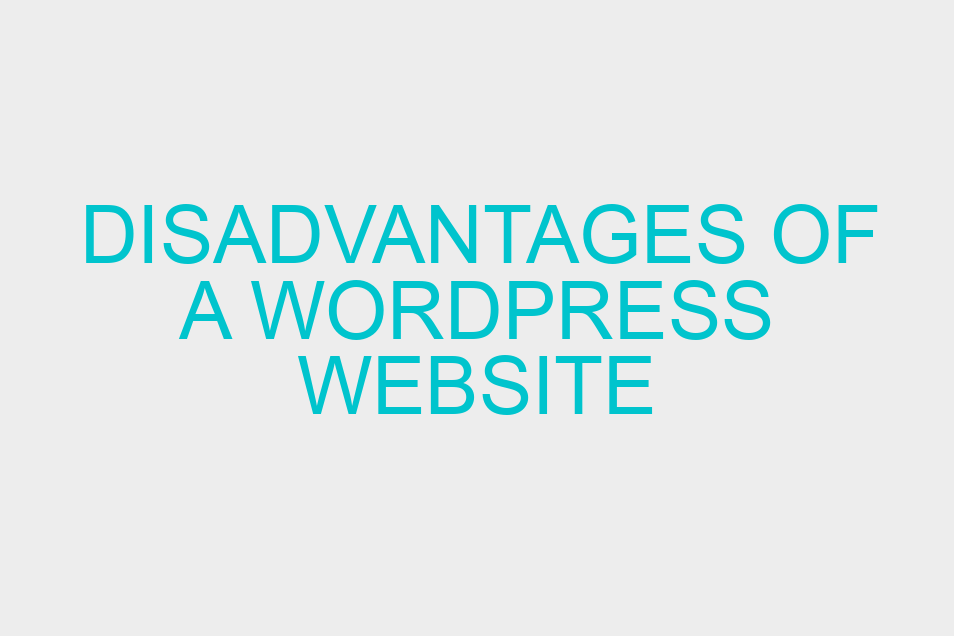Disadvantages of a WordPress website

It is true that WordPress has accumulated millions of fans. However, many don’t actually know the drawbacks of creating a WordPress website. I’ve decided to be a rare exception in the already harmonious choir by injecting a certain dissonance into it. This is the truth about WordPress and every WordPress fan understands that just like any other platform, WordPress has its own share of drawbacks.
Are you planning to use WordPress for your website? Then this article is specifically for you. I crafted this article so that you get the real truth regarding WordPress before you dive in. This post is basically about the disadvantages that come with WordPress websites. Are there any major drawbacks that really bug its developers? Let’s try to find out:
Perhaps, the one and most serious of all disadvantages of WordPress websites, from my own viewpoint is that there are security concerns. Truth be said, most people tend to think its secure just because it’s one of the most popular CMS platforms across the globe. However, because of this, you’re site is likely to be compromised along with the rest of the WordPress websites around the globe. I’ve had client websites hit in the past so it can and does happen, especially if you don’t install any security plugins. So keep this in mind and be sure to install a good security plugin to be on the safe side.
Ready to Ignite Your Website?
If you are not satisfied with your current website designer or SEO, call me, Nicole Brooke. I’m highly efficient and always available.
Another drawback of choosing to have a WordPress website is that WordPress is not configured in the most optimal manner. For instance, you have to deal with numeric permalinks until you choose to employ SEO friendliness for your WordPress websites. This however is very minor if worth mentioning at all as this can be resolved but simply setting your permalink structure.
Have you noticed the slug, or do you even know what a slug is? No, it’s not a slimy thing you see on the footpath, it is the section of the permalink that comes after the domain name. Most people are not even aware of this. This is another challenge that WordPress users encounter bearing in mind that it’s one of the most useful components of a WordPress website but it is difficult to figure out. Most novices are puzzled over activating it.
Next are the WordPress components “Discussion” and “Comments”. Have you stopped to think that these two are completely different? The discussion lets you manage the activity of any particular unit of content such as a posts and pages. The “Comments” section appears from the screen that shows multiple pages and posts, but then disappears as soon as you enter the “Screen Options Page”.
The WordPress multi-site configuration process also called WordPress Network is very technical especially for novices though there is a vital idea to incorporate a production environment or staging server that depends on this specific feature. I am specifically referring to DeployMint now.
Quite a number of users have concluded that WordPress is not as intuitive as it could possibly be, but I must say, this is something to continue to improve in every new version. Once you go beyond the basics, the steepness of the learning curve gets even more surprising. Moreover, the ways in which themes and plugins modify the WordPress platform make it a complete challenge during a configuration process.
Fundamental tasks such as developing taxonomies and custom posts for a WordPress website can include creating several complicated technical codes, where other content management system software has a more friendlier graphical interface that attain the similar thing.
In most cases, WordPress website tutorials are inadequate and inconsistent. In fact, because it is an open source solution, you are basically learning from enthusiasts that may or may not have the required understanding of what they are actually teaching. Sometimes, it really takes a long times to debug your site especially after a clash if you employ just the reputed resources. There is always a great possibility that the tutor can skip a small step that might make all your efforts naught.
Again, because WordPress is open source, I’ve found it to have an incomplete and inconsistent documentation. If you use it as a Content Management System, then you’ll most likely come across pages regarding certain functions on the WordPress.org website codex that ideally had a notice inviting people to document the function. In short, there are also undocumented features and functionalities. They even lack a blank page in the codex. This requires that you take time to review the source code to find out whether those features exist. In some other instances, you are told a specific function returns an object, but there is no clue regarding the form it will take or even where to get that information.
Conclusion
Yes, WordPress has some disadvantages, but in saying this, I personally will never stop creating WordPress websites for my clients or even consider using a different CMS. The simple truth of the matter is, despite all the drawbacks, it is still the most preferred of all software platforms. It is honestly the result of what we admire on the internet. Bear in mind that all the points discussed above are personal viewpoints and are subject to disagreement. Still, I would confidently say that the advantages of WordPress outweigh its disadvantages tenfold. Having said that, get in touch with me for more information regarding Gold Coast WordPress websites, benefits, and drawbacks without forgetting where you can get your WordPress website customised.
Related Topics
